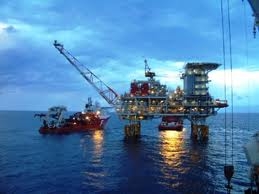PVN could have contributed more to state budget
 The rate is much lower than that of other oil and gas enterprises in other countries.
The rate is much lower than that of other oil and gas enterprises in other countries.
In Russia, Vietnam’s main partner in oil extracting, the rate is as high as 72 per cent, according to an official from the Ministry of Finance.
This means that while they are operating in the same sector, the budget contribution the Russian oil and gas enterprises have to give is 16 percentage points higher than that of their Vietnamese counterparts, he said.
“It is a huge disparity,” commented Doctor Le Dang Doanh, former member of the Prime Minister’s research board.
When PVN reaped around US$9 billion in revenues from oil and gas extracting activities in 2010, the difference was already as large as $1.4 billion, or VND30 trillion.
“We should review the case to ensure economic effectiveness for the country,” he urged.
The 56 per cent contribution could be appropriate at a certain time, but amid these hard economic times it should be revised, said Doanh, adding that the country’s oil and gas reserves also show signs of becoming exhausted.
Even in Indonesia, a developing country like Vietnam, the budget contribution rate for the oil and gas sector is between 55 and 85 per cent, Sanjeev Gupta, Oil and Gas Leader Asia Pacific Region at Ernst & Young, told Tuoi Tre in an interview on April 12.
“Only the areas with special preferential policies from the government can have the 55 per cent rate,” he said.
Meanwhile, Malaysia-based Petronas also has to contribute 50 – 60 per cent of revenues to their national state budget, he added.
The levy depends on not only the location of the reserves, but also how long they have been extracted from, he said.
With the new oil reserves, the rate can be low due to the high risks they pose.
“But with the long-extracted ones, as risks have reduced, the government should levy a higher rate,” he said.
What the stars mean:
★ Poor ★ ★ Promising ★★★ Good ★★★★ Very good ★★★★★ Exceptional
Latest News
More News
- State corporations poised to drive 2026 growth (February 03, 2026 | 13:58)
- Why high-tech talent will define Vietnam’s growth (February 02, 2026 | 10:47)
- FMCG resilience amid varying storms (February 02, 2026 | 10:00)
- Customs reforms strengthen business confidence, support trade growth (February 01, 2026 | 08:20)
- Vietnam and US to launch sixth trade negotiation round (January 30, 2026 | 15:19)
- Digital publishing emerges as key growth driver in Vietnam (January 30, 2026 | 10:59)
- EVN signs key contract for Tri An hydropower expansion (January 30, 2026 | 10:57)
- Vietnam to lead trade growth in ASEAN (January 29, 2026 | 15:08)
- Carlsberg Vietnam delivers Lunar New Year support in central region (January 28, 2026 | 17:19)
- TikTok penalised $35,000 in Vietnam for consumer protection violations (January 28, 2026 | 17:15)
















 Mobile Version
Mobile Version